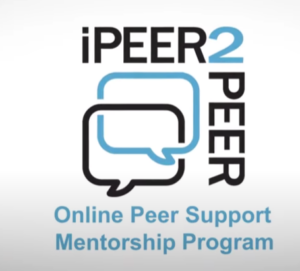iPeer2Peer Support Mentorship Program in Paediatric Solid Organ Transplantation
Principal Investigator: S. Anthony
Co-Investigators: E. Ghent, A. Gold, K. Martin, M. Solomon, J. Stinson, CW. Teoh, S. Ahola-Kohut, S. Soto, S. Urschel
The iPeer2Peer Program was developed by the iOUCH research team at The Hospital for Sick Children to help teenagers with chronic disease better manage their symptoms. When children become teenagers, they start making more decisions about their lives and their health. This is called self-management. Most young people do not learn how to manage their disease or get the support they need to be able to do so. Many have also never met another person with the same disease. Peer support could help meet this need. Providing face-to-face peer support using the Internet is a new way to make self-management education and support available to teenagers with chronic disease.
The Anthony lab is currently conducting a phased research project to adapt the iPeer2Peer program for adolescents and young adults who are candidates for or recipients of a solid-organ transplant.
PHASE 1: Needs Assessment
Aim: The burden of disease and cost of paediatric solid organ transplantation demand convenient, acceptable and accessible methods for patients to benefit from evidence-based self-management and peer support practices. iPeer2Peer is a successfully established peer support mentorship program that has been tested in multiple disease populations. A needs assessment was conducted to explore the perceived self-management and peer support needs of transplant patients and determine the necessary adaptations required to modify the iPeer2Peer program for a transplant population.
Methods: The qualitative study design included semi-structured interviews and was guided by interpretative description, a qualitative approach which presupposes that a study is informed by scientific, theoretical and clinical knowledge. Individual interviews were audio-recorded, transcribed verbatim and subject to qualitative content analysis using N-Vivo. Themes were refined through constant comparison until saturation was reached.
Results: Interviews were conducted with 15 participants (60% female) ages 14 – 22 years with a range of transplant types; heart (n=4), lung (n=3), kidney (n=5) and liver (n=3). Emerging themes included 1) unanimous endorsement for a peer support mentorship program – “most definitely it would be great”, 2) benefits of the program for mentees – “talking to someone who has been through it”, and 3) benefits of the program for mentors – “being a role model”. In relation to self-management and coping skills, participants noted that mentors could “guide and train you”, and “give you tips” thereby “really increasing quality of life”. Participants also shared suggestions around logistics for program implementation.
Conclusions: Results indicate a clear need and desire for a peer support mentorship program within the transplant population. Consistent with the literature on peer support in healthcare, participants associated peer mentorship with emotional, appraisal and informational support. Next steps (Phase 2) will involve the implementation and evaluation of the adapted iPeer2Peer program within paediatric transplantation.
Knowledge Translation: Exploring the Potential for Online Peer Support Mentorship: Perspectives of Pediatric Solid Organ Transplant Patients. Anthony SJ, Young K, Ghent E, Gold A, Martin K, Solomon M, Teoh CW & Stinson JN. Pediatric Transplantation. 2020. doi: 10.1111/petr.13900.
iPeer2Peer Phase 1 Infographic
Funded by: SickKids Transplant and Regenerative Medicine Centre and Astellas
PHASE 2: Implementation & Evaluation
Aim: iPeer2Peer is an online peer mentorship program that provides modelling and reinforcement from trained young adult mentors who have learned to successfully manage their illness to adolescent mentees. The objectives of this study will be to determine: (1) the implementation effectiveness and (2) the preliminary clinical effectiveness of the iPeer2Peer intervention for adolescent and young adult thoracic transplantation recipients.
Methods: A waitlist randomized controlled trial (RCT) design will be piloted across two sites: the Hospital for Sick Children and the University of Alberta/Stollery Children’s Hospital. Trained peer mentors will be matched to mentees. Mentor-mentee pairings will connect through video calls and text messaging to provide peer support and encourage self-management skills. Primary outcomes focused on implementation (i.e. measures of feasibility, acceptability and engagement) and secondary outcomes focused on clinical effectiveness (i.e. measures of self-management and perceived social support) will be collected using standardized instruments and semi-structured interviews. Qualitative and quantitative data will be amalgamated to evaluate the iPeer2Peer intervention for adolescents and young adults within thoracic transplantation.
Results: Pending. Findings will lay the groundwork for a future definitive, multi-centre RCT evaluating the iPeer2Peer program across solid organ transplantation clinical populations.
Knowledge Translation: The iPeer2Peer Mentorship Program for Adolescent Thoracic Transplant Recipients: An Implementation-Effectiveness Evaluation. Anthony SJ, Lin J, Selkirk E, Liang M, Ajmera F, Seifert-Hansen M, Urschel S, Soto S, Boucher S, Gold A, Stinson J & Ahola Kohut S. Journal of Heart and Lung Transplantation. 2024;doi:10.1016/j.healun.2024.09.001.
iPeer2Peer Implementation-Effectiveness Infographic
Funded by: Enduring Hearts


